Tag: workshops
Advanced PubMed workshop

Want to make your searches for biomedical information more effective and efficient? The Library’s Life and Health Sciences Division is holding a hands-on workshop on advanced features of PubMed, including:
- How to use filters to focus search results on specific article types, publication dates and more
- How to add field tags to find articles by author, title, journal, and other criteria
- How Medical Subject Headings (MeSH) can help you find additional relevant information
- How to use My NCBI to save searches, set up alerts, and display results in your preferred format
- How PubMed links to information in other NCBI resources
Location: Bioscience Library Training Room, 2101 VLSB
Date: Wednesday April 12
Time: 12 – 1 pm
No pre-registration is required; all are welcome.
Questions? Please contact Elliott Smith at esmith@library.berkeley.edu
Great talks and tips in Love Your Data Week 2017
Opening out #LYD17 w/great discussion of #securing research data. Thanks to our experts speakers @UCBIDS @DH @DLabAtBerkeley @ucberkeleylib pic.twitter.com/DqvIKb9sDL
— Yasmina Anwar (@yasmina_anwar) February 14, 2017
This week, the University Library and the Research Data Management program were delighted to participate in the Love Your Data (LYD) Week campaign by hosting a series of workshops designed to help researchers, data specialists, and librarians to better address and plan for research data needs. The workshops covered issues related to managing, securing, publishing, and licensing data. Participants from many campus groups (e.g., LBNL, CSS-IT) were eager to continue the stimulating conversation around data management. Check out the full program and information about the presented topics.
Photographs by Yasmin AlNoamany for the University Library.
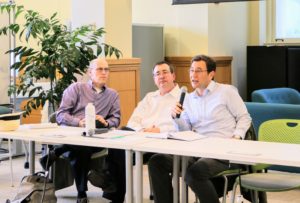
The first day of LYD week at UC Berkeley was kicked off by a discussion panel about Securing Research Data, featuring
Jon Stiles (D-Lab, Federal Statistical RDC), Jesse Rothstein (Public Policy and Economics, IRLE), Carl Mason (Demography). The discussion centered upon the rewards and challenges of supporting groundbreaking research when the underlying research data is sensitive or restricted. In a lively debate, various social science researchers detailed their experiences working with sensitive research data and highlighted what has worked and what has proved difficult.
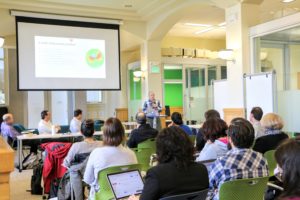
At the end, Chris Hoffman, the Program Director of the Research Data Management program, described a campus-wide project about Securing Research Data. Hoffman said the goals of the project are to improve guidance for researchers, benchmark other institutions’ services, and assess the demand and make recommendations to campus. Hoffman asked the attendees for their input about the services that the campus provides.
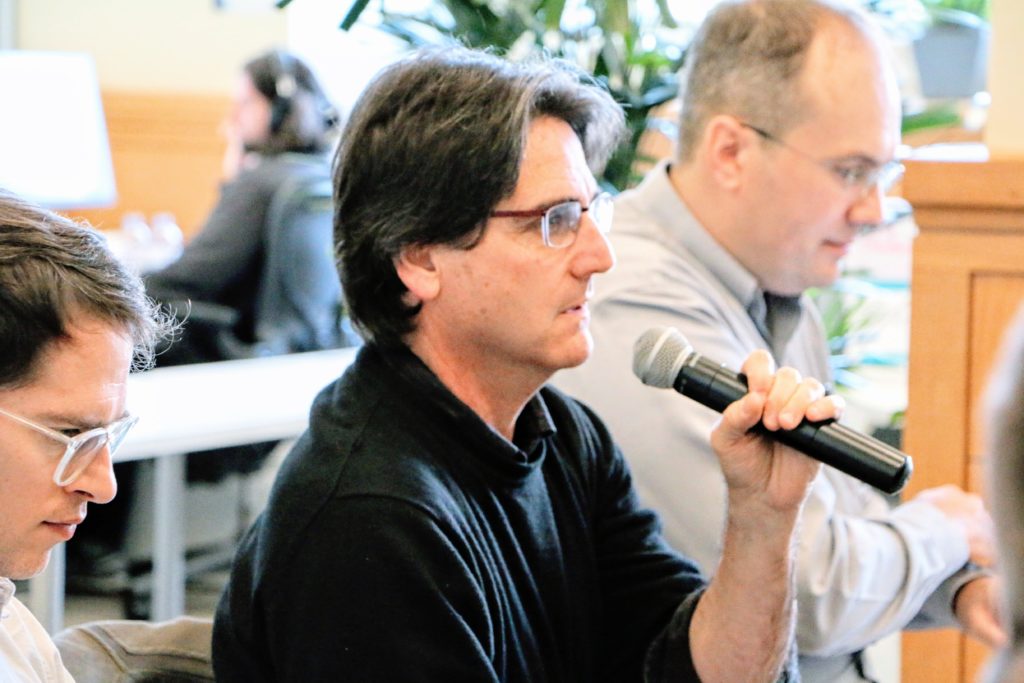
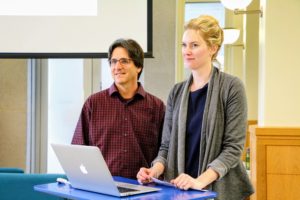
On the second day, we hosted a workshop about the best practices for using Box and bDrive to manage documents, files and other digital assets by Rick Jaffe (Research IT) and Anna Sackmann (UC Berkeley Library). The workshop covered multiple issues about using Box and bDrive such as the key characteristics, and personal and collaborative use features and tools (including control permissions, special purpose accounts, pushing and retrieving files, and more). The workshop also covered the difference between the commercial and campus (enterprise) versions of Box and Drive. Check out the RDM Tools and Tips: Box and Drive presentation.
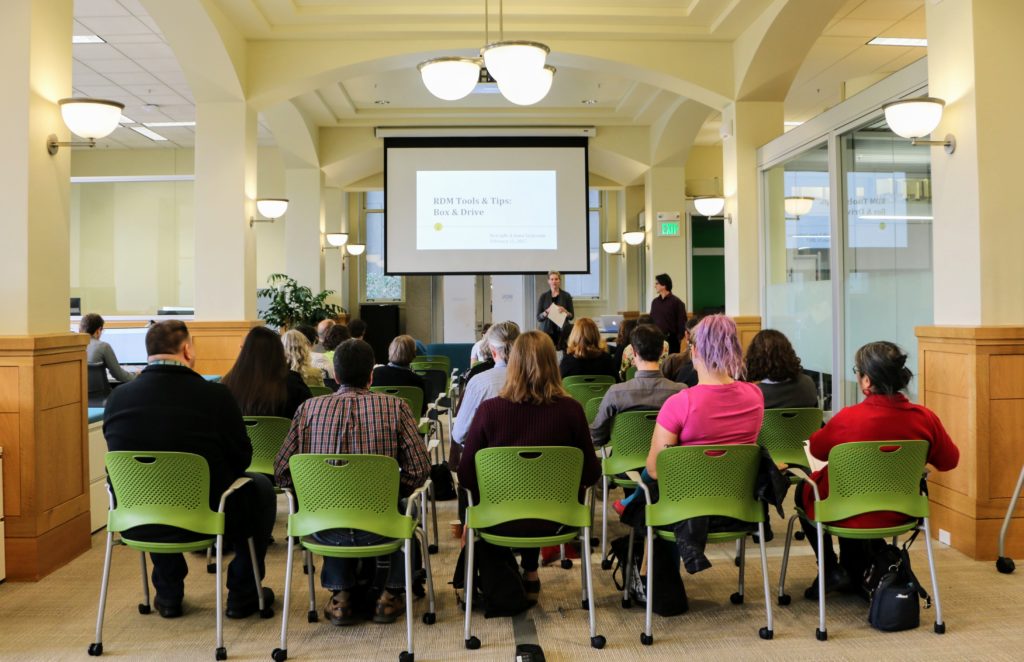
We closed out LYD Week 2017 at UC Berkeley with a workshop about Research Data Publishing and Licensing 101. In the workshop, Anna Sackmann and Rachael Samberg (UC Berkeley’s Scholarly Communication Officer) shared practical tips about why, where, and how to publish and license your research data. (You can also read Samberg & Sackmann’s related blog post about research data publishing and licensing.)
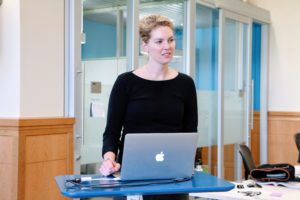
In the first part of the workshop, Anna Sackmann talked about reasons to publish and share research data on both practical and theoretical levels. She discussed relevant data repositories that UC Berkeley and other entities offer, and provided criteria for selecting a repository. Check out Anna Sackmann’s presentation about Data Publishing.
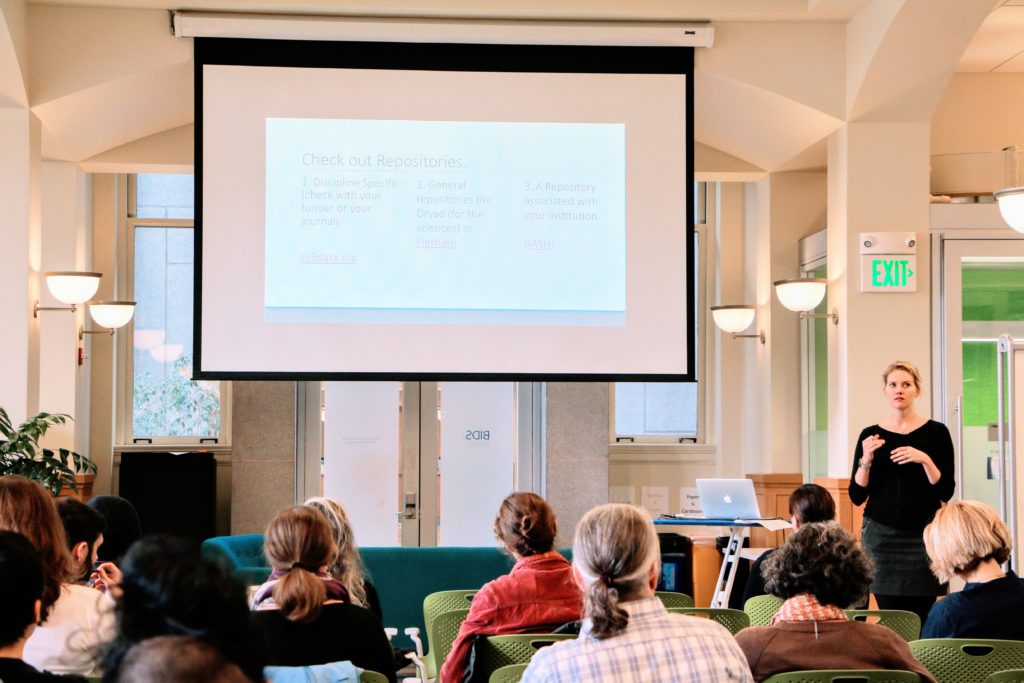
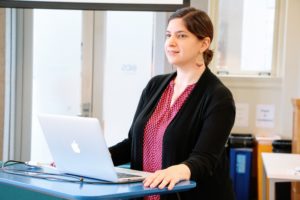
During the second part of the presentation, Rachael Samberg illustrated the importance of licensing data for reuse and how the agreements researchers enter into and copyright affects licensing rights and choices. She also distinguished between data attribution and licensing. Samberg mentioned that data licensing helps resolve ambiguity about permissions to use data sets and incentivizes others to reuse and cite data. At the end, Samberg explained how people can license their data and advised UC Berkeley workshop participants to contact her with any questions about data licensing.
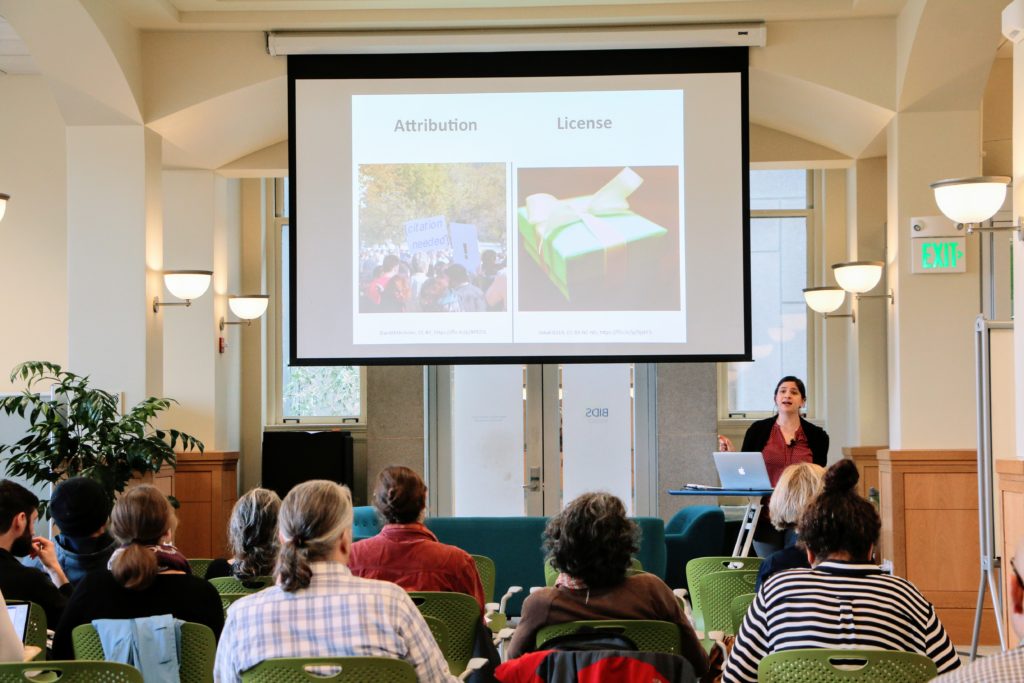
Check out the slides from Rachael Samberg’s presentation about data licensing below.
The workshops received positive feedback from the attendees. Attendees also expressed their interest in having similar workshops to understand the broader perspectives and skills needed to help researchers manage their data.
—
Yasmin AlNoamany
Special thanks to Rachael Samberg for editing this post.
Webinar: Cultural Competencies for an Aging LGBTQ Population
Want to learn more about the aging LGBTQ population? Interested in improving cultural competency for this vulnerable population? Then you might want to attend this free webinar by HRSA, to be held on Tuesday, December 13th from 10am-12pm PST.
This webinar will discuss the health and social care needs of older adults in the LGBTQ community. It will highlight the special obstacles faced by this population, opportunities to improve cultural competency and best practices to integrate LGBTQ-friendly care into your organization.
The webinar should be of interest to HRSA grantees, healthcare providers, public health officials, community-based organizations and advocates wanting to improve competency in serving the needs of aging LGBTQ patients in their practices.
Please be sure to register in advance as space is limited.
October Research Workshops

The Library continues to offer workshops throughout the Fall, many in partnership with the D-Lab, to help you out with citation management, GIS, statistics, data visualization tools, and much more. Hope you can join us!
- RefWorks for Beginners
Thu, September 29, 2-3pm (D-Lab, Barrows 356) - Introduction to Georeferencing
Fri, September 30, 10-11:30am (D-Lab, Barrows 356) - EndNote Essentials: Part I
Tue, October 4, 1-2pm (D-Lab, Barrows 356) - Finding Health Statistics and Data
Thu, October 6, 1-2:30pm (D-Lab, Barrows 356) - Demographic Mapping with SimplyMap and PolicyMap
Tue, October 11, 11am-12:30pm (D-Lab, Barrows 356) - Introduction to Data Visualization
Wed, October 12, 1:00-2:15pm (D-Lab, Barrows 356) - EndNote Essentials: Part II
Thu, October 13, 1-2pm (D-Lab, Barrows 356) - Becoming More Productive: Workflow Strategies
Fri, October 21, 1-2:30pm (Bioscience Library Training Room, 2101 VLSB) - Introduction to ArcGIS Online
Fri, October 28, 10-11:30am (D-Lab, Barrows 356) - Creating Publication-Ready Maps
Tue, November 8, 12-1:30pm (D-Lab, Barrows 356)
Webinar: Achieving Health Equity – One Policy at a Time
Are you interested in hearing the tale of how one department of health used policy and administrative levers to to apply a health equity lens to proposed state legislation? Then you might want to attend this webinar. It features speakers from the Washington State Department of Health (DOH).
Washington’s DOH initiated efforts to apply a health equity lens to proposed state legislation. The department succeeded in adding two requirements to help focus the review process on health inequities for bill analysis:
• Describe any positive or negative impact the bill may have on health equity or health disparities.
• Describe any positive or negative impact the bill may have on tribal health concerns.
The speakers will describe the components of a health equity lens used to analyze proposed state legislation, talk about the opportunities and challenges involved in applying a health equity lens, and share examples of training and resource materials.
When: September 22, 2016
Time: 12:00-1:00pm PDT
Cost: Free
This webinar is part of the series: “Promoting Health Equity through Programs and Policies”. The series is sponsored by the National Partnership for Action to End Health Disparities (NPA), an initiative led by the U.S. Department of Health and Human Services, Office of Minority Health. NPA promotes cross-sector, multi-level and systems-oriented approaches for tackling health disparities.
You can learn more about this including how to register here.
Putting the Party in Participatory Evaluation with Youth: an HPCB webinar
Do you need to evaluate youth programs as part of your work? Are you interested in ways to make these evaluations participatory? Want to learn how others do this? Then you might want to join this webinar from the Health Promotion Capacity Building (HPCB) team of Public Health Ontario.
According to the CDC, participatory evaluation approaches provide meaningful opportunities for involvement by the stakeholders in initiatives. Participatory evaluation may also provide stakeholders with opportunities to develop and enhance new skills.
The speakers for this will talk about a tool they’ve used which may aid in engaging youth in participatory evalution. The tool, 11 Principles of Youth Engagement, was developed by the Ministry of Health and Long-Term Care. They will also be putting a particular emphasis on data collection.
When: September 22, 2016
Time: 7:30-9:00am PDT
Register here
The webinar will explore:
* Benefits of participatory evaluation with youth;
* Facilitators of a successful evaluation including youth;
* Tools and techniques for use in participatory data collection including questionnaires, interviews, digital storytelling, PhotoVoice and Most Significant Change.
NCBI bioinformatics tools: An introduction

A hands-on workshop introducing NCBI bioinformatics tools such as PubMed, Gene, Protein, Nucleotide, and BLAST:
- Starting with a disease, syndrome, or process, identify the genes/proteins involved
- Starting with an organism and a protein, find the protein sequence and gene coding region
- Starting with a sequence, identify the gene/protein and source
The workshop will cover selecting the proper tools for your question, navigating through the interlinked NCBI databases, and saving your results.
- Date: Wednesday, Sept. 7
- Time: 12 – 1 pm
- Location: Bioscience Library Training Room, 2189 VLSB (inside the library)
Open to all interested students and researchers; no registration is required.
Questions? Contact esmith@library.berkeley.edu
Workshops on citation management tools
The Library is offering a range of workshops on different citation management tools.
RefWorks
An intro class to the new RefWorks
Sept 28 3-4 pm Bioscience Library Training Room
Sept 29 2-3 pm D-Lab 356 Barrows
EndNote
Endnote Introduction
Sept 14 11:45 am-1 pm Bioscience Library Training Room (VLSB)
Endnote for MACs
Sept 28 11:45 am-1 pm Bioscience Library Training Room (VLSB)
Endnote Essentials
Part 1 will be more introductory; Part 2 will cover some advanced features
Oct 4 Part 1 1-2 pm D-Lab 356 Barrows
Oct 13 Part 2 1-2 pm D-Lab 356 Barrows
Zotero
3-part workshop covering getting started with Zotero, Zotero Basics, and some advanced features
Sept 21 12:30-3:30 pm D-Lab 356 Barrows
Mendeley
Sept 20 12-1 pm Bioscience Library Training Room (VLSB)
Fall Workshops and Tours in the Bioscience Library
Workshops
This fall there is a packed schedule of drop-in workshops in the science libraries. No sign-up is necessary – just drop in and learn! Topics include Citation Management, Productivity Tools, Geographic Information Systems (GIS), Data Management, EndNote, Data Visualization, NCBI, and more. Many of these workshops will be held in the Training Room in the Marian Koshland Bioscience and Natural Resources Library. Please check the Science Libraries Events Calendar for times, dates, and class descriptions.
Tours
We will be offering three tours of the Marian Koshland Bioscience and Natural Resources Library.
- Friday, September 2, 1:30 pm
- Thursday, September 8, 11:30 am
- Friday, September 16, 1:00 pm
All tours are 30 minutes long and are offered on a drop-in basis.
Meet at the Library’s Circulation Desk, 2101 Valley Life Science Building. Event Contact: 510-642-2531
Fall Workshops
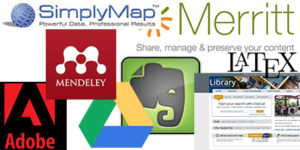
The science and engineering libraries are holding a series of workshops during Fall Semester that can help you get the most out of freely available as well as Berkeley subscribed resources. Workshops include:
- Intro to citation management: EndNote, RefWorks, Mendeley, and more
- Intro to LaTeX: introduction to learning how to write documents in LaTeX
- Productivity tools: Berkeley online tools for reading, writing, and collaborating more effectively
- Intro to GIS tools and resources: an introduction to Geographic Information Systems and mapping tools
- Efficient Data Management Practices: Tools and services at UC Berkeley: learn about data management best practices, funder requirements, and how to best achieve transparency and reproducibility for the long-term.
Check out the full schedule with locations and times on our Events Calendar. All workshops are drop-in – no registration required.